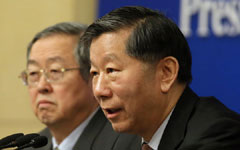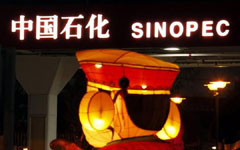Feelings are mixed over mixed-ownership model
By Meng Jing (China Daily) Updated: 2014-03-13 08:27Members of China's top political advisory body have called for detailed regulations on developing a mixed-ownership economy, aiming to ensure that private enterprises will have a say when they inject capital into State-owned enterprises.
A mixed-ownership economy, which allows non-State capital to take equity stakes in projects featuring investment by SOEs, has been a hot topic during the legislative two sessions, the most important annual event on China's political calendar.
 |
 Sinopec is allowing in private investors
|
Private capital will also be allowed to participate in areas such as banking, electricity, resource development and public utilities, the report noted.
Many political advisers said they are excited to see that SOEs are further opening up to non-State investment.
Feng Dongming, chairman of the board of Markor Investment Group Co Ltd, which has businesses covering from furniture to chemicals, said it's a very positive sign that the development of a mixed-ownership economy has been put higher on the government agenda.
"It boosts confidence of not only private entrepreneurs but also SOEs, making us aware that injecting non-State capital into SOEs is a solid option that is supported by the central government," said Feng.
But ensuring that private investors have a voice in the management of these "hybrid" companies is the top concern among political advisers.
Laws and detailed regulations governing the development of a mixed-ownership economy are being strongly supported by political advisers from SOEs and private companies.
Pan Gang, chairman and president of dairy company Inner Mongolia Yili Industrial Group Co Ltd, said that it won't necessarily be easy for private companies and SOEs to work together.
- NHTSA says finds no 'defect trend' in Tesla Model S sedans
- WTO rare earth ruling is unfair
- Amway says 2014 China sales may grow 8%
- President Xi in Europe: Forging deals, boosting business
- CNOOC releases 2013 sustainability report
- Local production by Chery Jaguar Land Rover this year
- Car lovers test their need for speed in BMW Mission 3
- China stocks close mixed Monday

















